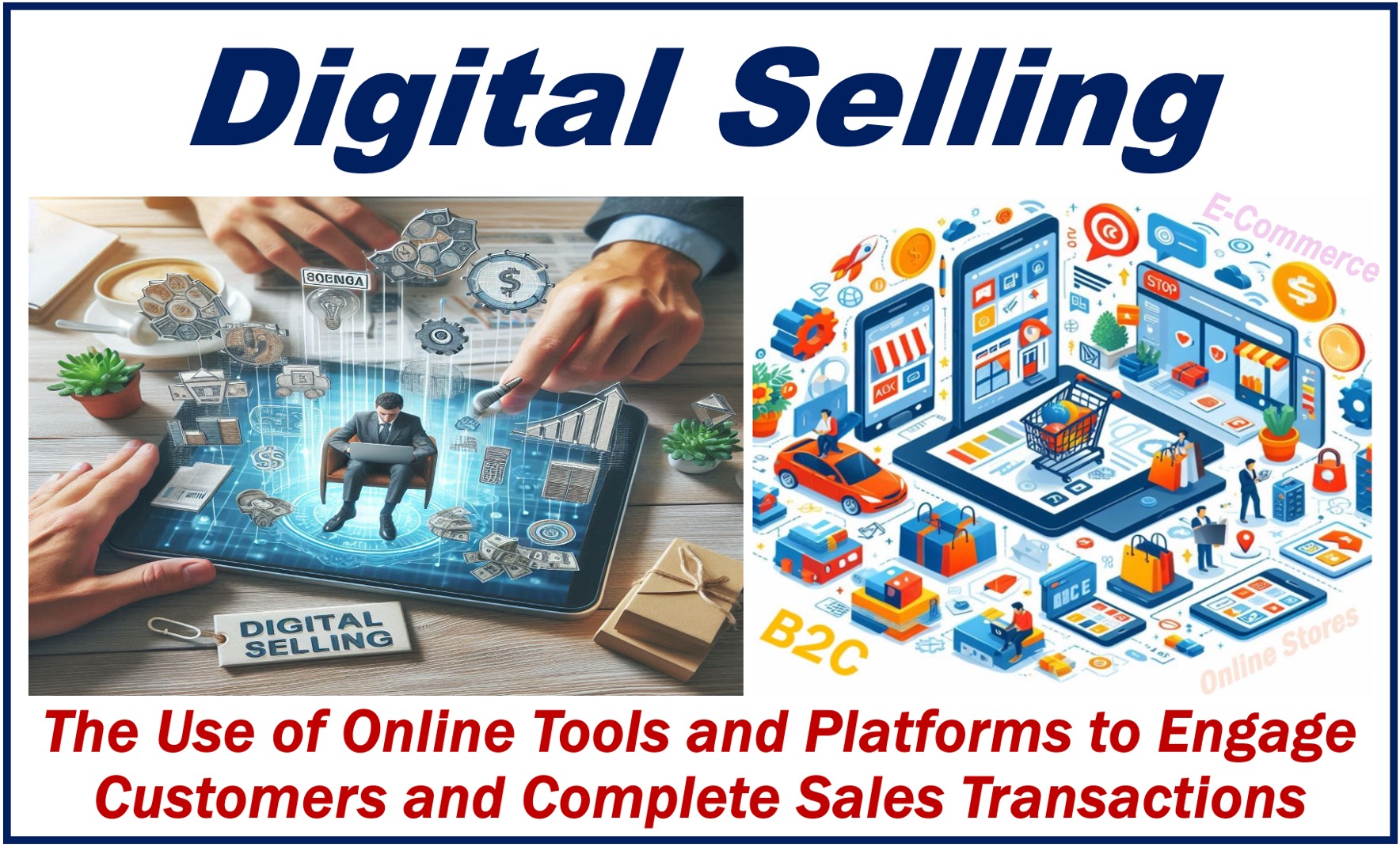Do you sell product or services online? If you do, you are a Digital Seller – you practice Digital Selling, which is also known as Digital Sales.
Digital selling is a modern sales approach that leverages digital technologies to engage with prospects and customers, promote offerings, and complete transactions.
Over the past few decades, businesses and consumers have been increasingly relying on the Internet. For companies today, digital selling has become essential if they want to remain competitive and reach a wider audience.
Salesforce.com says the following about digital sales:
“Digital sales refers to the process of selling your products and services online. This includes many different digital channels, including websites (online stores), social media platforms, email, and chat.”
Digital Selling – Brief History
Digital selling began in the early 1990s with the advent of the Internet and World Wide Web. It gained traction as web browsers like Netscape and Mosaic made the Internet accessible to the public.
The first secure online transaction was for a CD in 1994 for $12.48 (plus shipping). One year later, e-commerce pioneers eBay and Amazon were founded.
The 2000s saw further growth with the rise of search engines, social media platforms, and mobile technology, while the 2010s introduced sophisticated digital marketing strategies and widespread smartphone use.
When the global COVID-19 pandemic hit in early 2020, hundreds of millions of people were told to stay at home, which accelerated the shift to online shopping for consumers and digital selling for businesses.
Over the past thirty years, as digital selling has risen, traditional offline commerce—transactions in physical brick-and-mortar shops—has declined.

E-Commerce and Online Shopping
There are two terms closely related to digital selling: e-commerce and online shopping:
- E-commerce, short for “electronic commerce,” refers to doing business online. For example, Amazon.com is an e-commerce company.
- Online shopping means buying things online. If I order my supermarket groceries online for home delivery, I am online shopping.
Key Components of Digital Selling
If you want to be a successful digital seller, you need to focus on several key components that collectively drive online success and customer engagement.
-
Online Presence
You must establish a strong online presence. This involves creating a professional website, setting up social media profiles, and utilizing online marketplaces.
A well-designed website serves as the digital storefront, providing information about your products or services, company details, and contact information.
You need to create and share valuable content to attract and engage potential customers.
This can include blog posts, videos, infographics, and eBooks. Effective content marketing helps build trust and authority, driving traffic to your website and generating leads.
-
Social Media Engagement
Social media platforms such as Facebook, Instagram, LinkedIn, and X (formerly Twitter) are powerful tools for digital selling. They enable you to connect with your audience, share updates, and promote products.
Engaging with customers through comments, messages, and posts helps build relationships and fosters loyalty.
Email marketing is a highly effective digital selling strategy. By collecting email addresses through website sign-ups, you can send newsletters, promotional offers, and personalized messages.
This direct communication helps nurture leads and encourages repeat purchases.
When people search for something that you sell in a search engine like Google, you want your website to appear on the first page of the search results. If it does, it means that your website has good SEO – it has been well optimized for search engines.
SEO involves using relevant keywords, creating quality content, and improving site performance.
With a strong SEO, your business is much more likely to succeed.
-
Paid Advertising
To promote your business, you could place ads in Google, Yahoo, and other search engines. Social media advertising, which is becoming increasingly popular, can also be very effective.
Paid advertising can increase brand awareness and drive traffic to your website. Pay-per-click (PPC) campaigns, display ads, and sponsored posts are common forms of paid advertising in digital selling.
CRM systems help manage customer interactions and data. They allow you to track leads, monitor sales, and analyze customer behavior. CRM tools are essential for maintaining organized and efficient digital selling processes, ensuring that no potential customer is overlooked.
AI is transforming digital selling by enhancing customer experiences and streamlining operations.
You can offer 24/7 customer support with AI-powered chatbots that handle enquiries and process orders anytime.
These chatbots offer instant, personalized responses, boosting customer satisfaction and engagement.
Additionally, AI analyzes customer data to provide insights and recommendations, improving your digital selling strategies.
Benefits of Digital Selling
Digital selling offers several advantages over traditional selling methods. Let’s take a look at some of them:
-
Wider Reach
Digital selling enables you to reach a global audience, breaking geographical barriers.
For example, a traditional toy shop in Chicago can only sell to people who walk in off the street.
An online toy store, on the other hand, can sell to people across the entire country and even to shoppers on the other side of the world.
-
Cost-Effective
Online marketing and sales channels often have lower costs compared to traditional methods. This often means that you can offer lower prices than your offline counterparts.
-
Data-Driven Insights
There are many digital tools that can provide you with valuable data and analytics. They can help you better understand customer behavior and refine your marketing strategies.
There are also tools that can tell you how effective your marketing strategy has been.
-
Convenience
Customers can browse, compare, and purchase your products at any time. People who are busy at work all week do not need to wait for the weekend to buy your products.
Final Thoughts
In today’s digital age, digital selling is crucial for businesses looking to stay competitive and grow.
By leveraging online tools and platforms, you can effectively reach and engage with your target audience, driving sales and building long-term relationships.
Whether through a strong online presence, content marketing, social media engagement, or other digital strategies, the opportunities in digital selling are vast and continually evolving.
